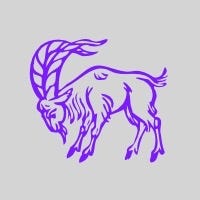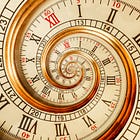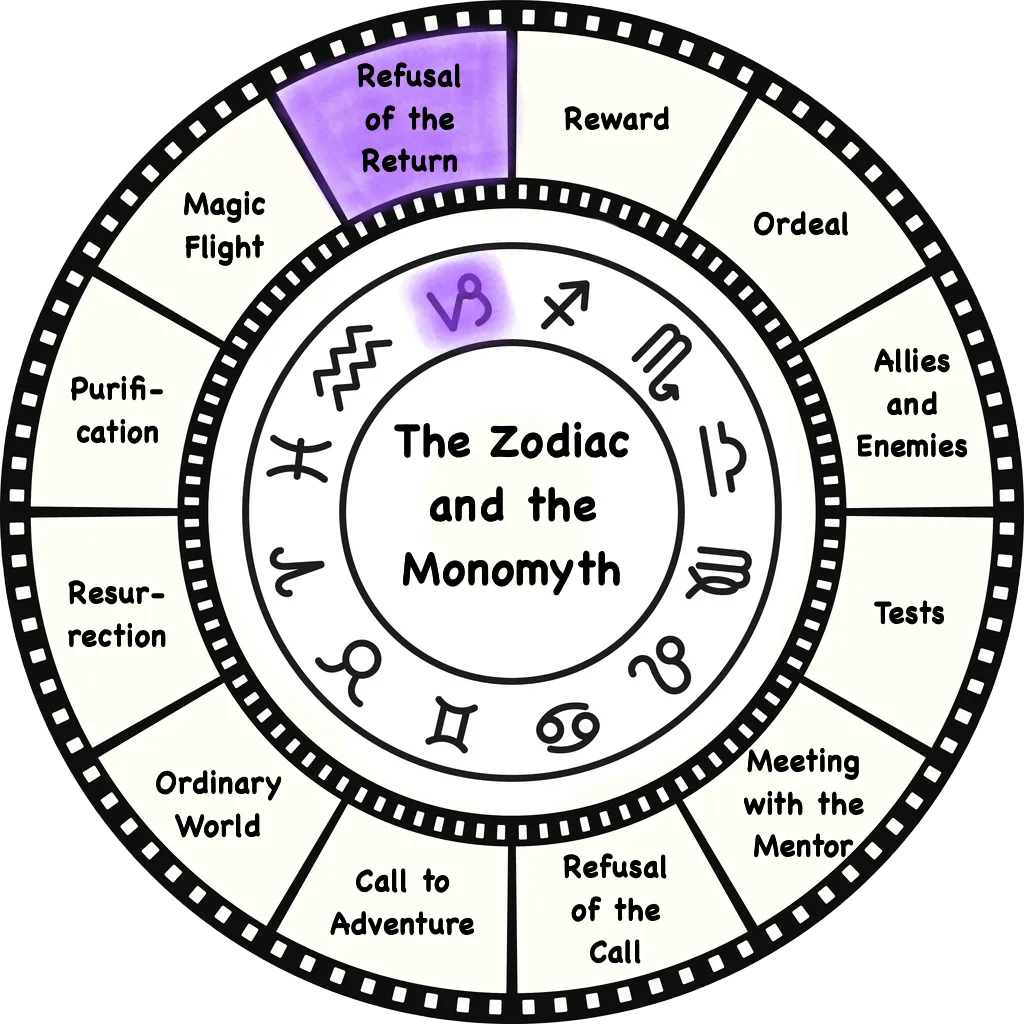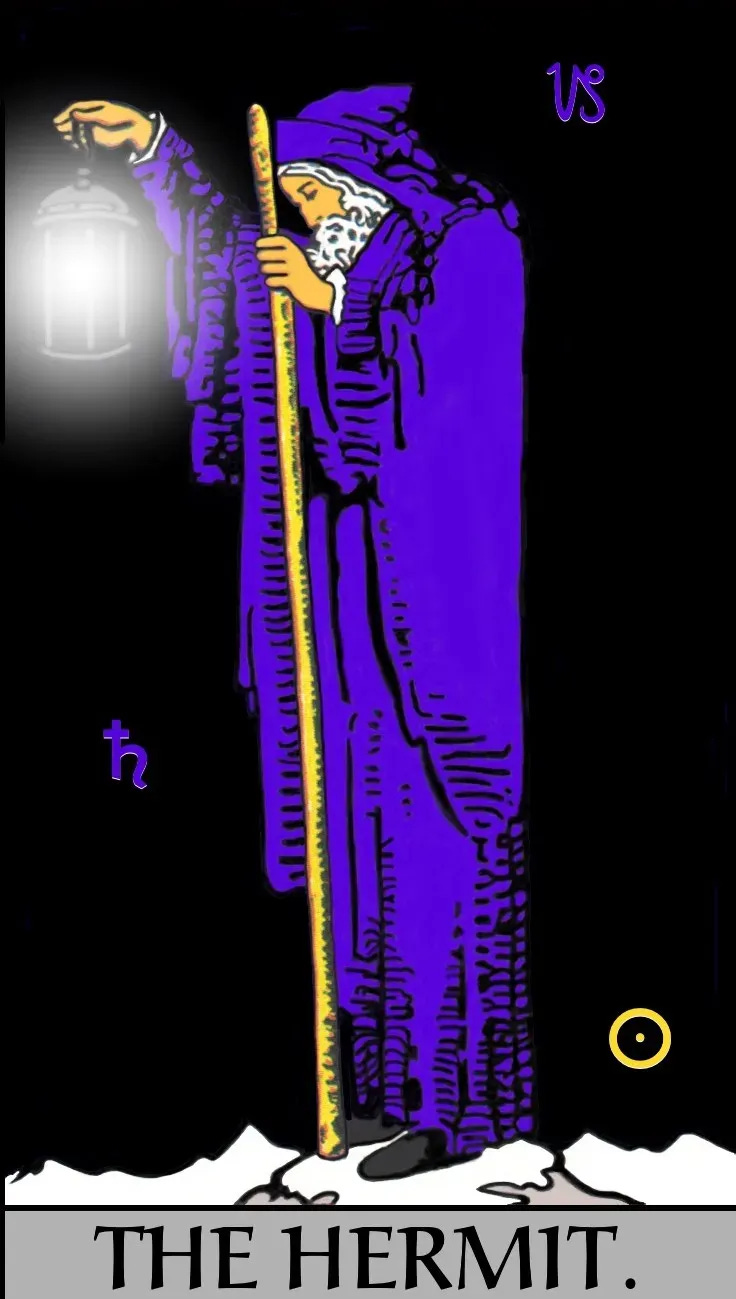Quest for the Elixir: Consolidation and Preservation
Refusal of the Return, Capricorn, and The Hermit
Quest for the Elixir
This post is part of an ongoing series. If you’re new to it, you’ll want to read the introduction first (about 6 minutes):



Three Articles About a Chapter of the Universal Story
Each edition of Quest for the Elixir consists of three articles about one of the 12 chapters in the cyclical Universal Story.
The first article is an exploration of the chapter from the perspective of the Hero’s Journey in Joseph Campbell’s monomyth.
The second article is a view of the same chapter in terms of the Zodiac sign corresponding to it in the cycle.
The third article is about the meaning of the chapter as symbolized in a Major Arcana card of the tarot.
During the month of the Sun’s transit through Capricorn, we observe the chapter of Consolidation and Preservation in the Universal Story. In celebration, I offer the following three articles:
The Monomyth: Refusal of the Return
Here we reach a turning point in the universal story. A major battle has been fought and survived. There has been horror and tragic loss, but the struggle eventually ended in the successful gain of the prize that had been sought. The victory celebration has been so joyful that everyone has forgotten that it couldn’t last forever, and that they would have to face whatever might come afterward. But at this point something occurs that breaks the festive spell and brings the company back down to awareness of concrete reality, necessity, and duty.
It’s time to end the celebration and return with the prized elixir to the Ordinary World from whence the adventure began. An alarm might be heard, or the ticking of a clock, or a significant action by one of the company might refocus attention on the purpose at hand. Sometimes a rallying enemy from the battle (or his agent) disrupts the party, intent on revenge. Whatever the mechanism, the call is received, the mood is changed, and the hero must decide what to do next.
There is a strong temptation to cling to the glory of the recent achievement. Neither the return nor the sharing of the elixir will necessarily be easy, and not all heroes respond to the call in the same way. Some set out on a triumphant return to ordinary life, only to be caught in some struggle with burdensome remnants of the past until such time as they manage to break free. Others opt to refuse the return to ordinariness simply because they wish to take advantage of their newfound authority and power.
Except for those who have apparently transcended any desire or need for time and experience in the physical world, it seems that all of these heroes are now stuck, at least for a while, ‘frozen’ in the past along with their precious trophies, which they may choose to use for good or ill.
"The myths and folk tales of the whole world make clear that the refusal is essentially a refusal to give up what one takes to be one's own interest. The future is regarded not in terms of an unremitting series of deaths and births, but as though one's present system of ideals, virtues, goals, and advantages were to be fixed and made secure." — Joseph Campbell
Those who refuse the return outright don’t want to give up the authority and advantages they gained in the course of their journey, preferring to preserve and perpetuate them however they can, for as long as possible. Those who accept the return may be ready for renewal in many ways, yet are waylaid by lingering attachments, or by unfulfilled responsibilities incurred somehow in their past.
In the children’s story The Wizard of Oz, the Wizard is discovered exercising his power and authority in Oz.
He really is a wise man, and benevolent too. He’s only acting scary because, like any effective teacher or parent, he needs for Dorothy to take him seriously. Some authorities are malevolent instead, like the Wicked Witch of the West, caring only for their own power and their control over their minions, whom they exploit while pretending to protect.
We can guess that the Wizard was probably stuck in Oz with a duty to deal with that evil Witch. His palace is surrounded by a heavily guarded wall, and he controls all under his sway as he likes. But to keep his power he must stay hidden and trapped there, and the powerful Witch reigned under a similar siege. How long could that pressure be comfortable for anyone? (It’s literally a matter of time.)
In this next clip, the Wizard explains how he came to Oz and chose to stay there for a while, having survived his own harrowing adventure. While in Oz, he has honored his commitments, and now he feels responsible for Dorothy’s return trip to Kansas.
Now the evil Witch is gone and the Wizard is ready to leave Oz, but not before responsibly securing his legacy in the hands of Dorothy’s companions.
Dorothy, who gained maturity by taking away the Witch’s power over her, now prioritizes her responsibility for her dog over her dependency on the Wizard for help. That’s the mature choice, and the Wizard can’t help her anyway. But now she’s stuck in Oz until she can find the right way to return home.


Capricorn
Of the three Earth signs, Capricorn is the winter one. We associate it with a period of contraction between harvest and new planting, when growth is suspended and resources consolidated and preserved against harsh weather. Taurus is floral and fertile for springtime planting, and Virgo is skillful in the harvest at summer’s end. But Capricorn, like the farmer himself, is responsible for the protection and overall management of the entire farm from year to year. Capricorn is the sign of the seeds, which carry the concentrated potential for new material growth wherever they’re planted. The equivalent of seeds in civilized society is money, which signifies a similar value. A keeper of seeds (or coins) is a master of material bounty.
The characteristics of Capricorn are essentially those of a responsible farmer (or parent), focused on basic needs. They include practical purpose, sound structures, firm boundaries, durability, reliability, patience, and persistence. Frugality and simplicity are desirable because they facilitate control; waste and unnecessary frills, which hamper efficient function, are not.
The style of Capricorn is traditional and classical. The method of doing things is time-tested, slow and sure; Capricorn prefers old-fashioned ways, even when difficult, for their reliability as proven in the past. A Capricornian person is one with enough age, experience, mastery and common sense to manage a farm, family, or other productive establishment successfully.
In an astrological chart, houses represent the various ‘departments’ of life, and the places where they function. The natural house of Capricorn is the 10th. Located at the top of the chart, it’s the seat of authority: the dominant parent, the employer, career, responsibility, and reputation (the way the public views us). The 10th house always serves a Capricornian purpose, though doing so in the style of whatever sign happens to be on its cusp in a given chart.
In the language of astrology, planets function as ‘nouns’ or ‘verbs’ that represent or express the various energies of life. Each sign reflects the qualities of the planet which rules it. The ruler of Capricorn is Saturn.
As a ‘noun’, Saturn is someone or something that is old or firmly established, such as elderly people, antiques & basic tools, traditions, laws, authorities, containers, and boundaries preventing strays from established ways into the unfamiliar and unknown. It particularly indicates durable structures that enclose or hold things together, like skeletons, skin, and seed coats. It’s strongly associated with Time, so it’s clocks, watches, hourglasses, sundials, etc. and circular revolving things like wheels.
As a ‘verb’, austere and serious Saturn both bears and imposes heavy burdens, erecting and enforcing conditions that limit, squeeze, and mold. Wherever Saturn is, we can expect things to slow down, shrink, become more difficult or restricted, require serious attention, or possibly end. We may have to decide whether or not something is worth our effort, and either redouble our commitment to it or let it go.
Although Saturn bears the name of a Roman god, its strong connection to Time, physical substance, and the necessities of life on Earth shows its function to be that of a goddess. She’s the archetype behind the Earth Mothers of many cultures, whose harsh restrictions are really the “tough love” that goads us to develop our own strength and maturity. She can be the Good Mother who provides a firm foundation or, negatively, the Wicked Witch who squeezes too hard and stifles growth. The (feminine) rings around the physical planet Saturn are meaningful symbols.
Nobody is really crazy about Saturn and Capricorn, whose positive side isn’t exactly fun, and whose negative side is cold and overcontrolling. If we’re experiencing that negative side, we may be selling ourselves out for convenience with nasty hidden strings. The secret of positive-side relief from that is to not expect or allow any ‘authority’ to do for us what we can do for ourselves. That way we don’t escape our responsibilities, but we do get to control the way we carry them out, and to preserve our self-respect.
The Hermit
Aided by his staff, the Hermit of the Major Arcana stands alone on snow, white bearded and white haired, clearly in the ‘winter’ years of his life. He’s been living for a very long time, and he’s still living. He probably has many of the Capricornian qualities described in the section above, especially persistence and endurance. For the time being, he is still there. He will continue to endure whatever he must, for as long as he needs to.
"Aging people should know that their lives are not mounting and unfolding but that an inexorable inner process forces the contraction of life. For a young person it is almost a sin and certainly a danger to be too much occupied with himself; but for the aging person it is a duty and a necessity to give serious attention to himself." — Carl Jung
So Jung describes the introspective Hermit. No illuminated landscape surrounds the Hermit, only the blackness of an empty night sky. There is nothing of importance in the surrounding world for him to see. His adventures far behind him, his companions gone, his capabilities greatly limited, and his life mostly past, only the most important of personal concerns remain to him.
“One great thing about growing old is that nothing is going to lead to anything. Everything is of the moment.” ― Joseph Campbell, A Joseph Campbell Companion: Reflections on the Art of Living
All the life in the scene is concentrated in the brilliant ball of pure white light contained in the lantern the Hermit carries. He gazes calmly at this light, which seems to be extremely important to him.
What is the Hermit’s light? Is it the memory of his youth or days of glory? Is it a vain intention to retain the unretainable? Is it his timeless bond with loved ones who have gone? His love for the family he would give all to protect? Preparation of a legacy for posterity? An unfulfilled promise? A “bucket list”? A focus of spiritual inspiration that he treasures like a captured star? Or is it, perhaps, some combination of these? Whatever it may be to him, we can be sure that it means some serious commitment that he is determined to fulfill at all cost while he still can.
In divination I read the Hermit as someone’s patient commitment to a purpose that requires steadfast effort for as long as it takes.
If it’s reversed, I take it as either a refusal to commit to a burdensome effort, or the completion or abandonment of such an effort.








